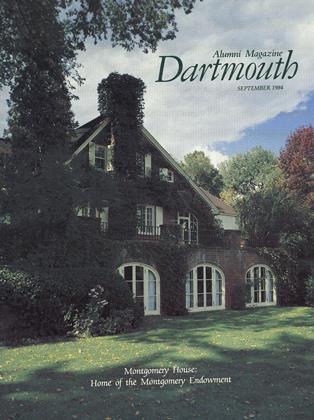When Professor of History Jere Daniell '55 reported on faculty matters at the 148th meeting of the Alumni Council on May 31 to June 2, he noted the "ring of familiarity" about the list of current faculty concerns. Indeed, the whole range of topics considered is much the same from one Council meeting to the next, but a substantial amount of business gets transacted and information gets imparted during each biannual convening of the Council. Following are highlights of the 148 th session.
In his main address to Councilors, President McLaughlin emphasized that "the qualities of Dartmouth which contribute to the sustained excellence of this kind of an institution are institutional loyalty and commitment." He spoke of the diversity and eminence of visitors to campus over the past year and of the importance of the liberal arts and the liberal conscience in preparing students to deal with opposing views with tolerance and peace. He noted the educational forces at work in campus debate on the Indian symbol, gay rights, ROTC, and the student press, urging alumni to consider the nature of the academic environment before being critical of the College. "The integrity of the process is almost as important as the decision itself ... in contributing to personal and collegial understanding," he explained.
Among committees which met were: Faculty: The list with a "ring of familiarity" included divestiture, the Review, ROTC, and salaries especially at the assistant and associate professor levels. Also noted were the fact that the faculty is now 66 percent tenured and concern about the shrinking pool of academics from which to draw for the nineties.
Student Life: Deans Shanahan and Lesher reported on progress by fraternities and sororities in meeting Minimum Standards and on renovations in dorm clusters. The committee endorsed increased involvement by alumni in providing program opportunities for fraternities/sororities and for dorm clusters. The two undergraduate representatives on the Council spoke eloquently about their Dartmouth experiences. Tom Callahan '84 noted his wonder at being part of the Dartmouth community and said, "Anyone or anything worth loving as Dartmouth must encourage responsible introspection and positive criticism to remain strong and effective." And Wendy Folberth '84 spoke on the struggle for individualism, the many approaches to personal and classroom challenges, and the growth in self-confidence that occurs over the four college years.
■ Enrollment and Admissions: The College's commitment to financial aid (more than $8 million for 1984-85) has elimi- nated the admit-deny problem. The av- erage aid package is $6,000 of schol- arship and $3,500 of self-help.
■ Athletics: The Sponsors' Program brought 130 prospective student-athletes to campus in 1983-84. The men's and women's varsity teams won 40 percent of their Ivy contests last year; alumni involvement in identification and recruitment of prospects was noted as a way to raise this percentage. The committee discussed a DCAC resolution supporting "any student initiatives" for solving the symbol controversy.
■ Class Organization: The annual class activity reporting process was discussed, with suggestions made for increasing accountability and involvement.
■ Regional Organization: Two new alumni clubs (Vero Beach, Fla., and Colorado Springs) raise the total number of clubs worldwide to 151.
■ Ad Hoc Committee on Alumni Affairs: Headed by Jonathan Strong '56, the committee presented its final report; several recommendations from it are already being implemented. The vice president's title has been changed from alumni affairs and development to alumni and public affairs; the secretary of the alumni office is now the office of alumni programs and is headed by Michael Choukas '51; the Alumni Magazine and the director of communications now report to the vice president; the Bulletin and the office of public programs now come under the director of communications; and a new office of alumni and communications planning, headed by J. Michael McGean '49, was established.
 View Full Issue
View Full Issue
More From This Issue
-
 Feature
FeatureDennis Brutus Speaks Out
September 1984 By Kendal Price '78 -
 Cover Story
Cover StoryThe Montgomery Endowment Finds a Home
September 1984 By Shelby Grantham -
 Feature
FeatureRichard Eberhart at Eighty: The Long Reach of Talent
September 1984 By Jay Parini -
 Feature
Feature"Three ... Forty-two ... Hut"
September 1984 By Jim Kenyon -
 Feature
Feature"Innocent Ardor and Delight": A Tribute to Richard Eberhart
September 1984 By James Melville Cox -
 Article
ArticleRumblings On Fraternity Row
September 1984 By Fred Pfaff '85
Article
-
 Article
ArticleFRESHMAN BASKETBALL
February, 1912 -
 Article
ArticleDartmouth Authors
JUNE 1982 -
 Article
ArticleChapter Three: The Kid Gets a (New) Life
DECEMBER 1998 By "Mom" -
 Article
ArticleA Postponed Power
May 1993 By James O. Freedman -
 Article
ArticleDANIEL CROSBY GREENE
May 1920 By Philip Sanford Mar den '94 -
 Article
ArticleWould 'Twere So!
January 1935 By The Editors

